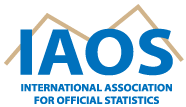This has been a year when everyone has been talking about statistics. Alongside the fear and tragedy of the global COVID-19 pandemic, people are looking to statistics for guidance on the things that matter to them. How safe is it for me go out? What are my future prospects for employment? What are the impacts on different communities? How will we pay back the debts our governments are running up?
Issues that have always been central to the Fundamental Principles of Official Statistics are now being debated in locked down virtual forums across the world. How can we mobilise the power of data to help make better decisions? How do we judge which data is trustworthy and which is being produced to hoodwink us into accepting a false picture, deflect our attention or make us believe in the world view of some vested interest?
The IAOS has been active in airing these issues in recent months and has highlighted many examples, good and bad, from which we can learn. The June issue of our Journal has some excellent papers on COVID-19, on pre-release access and other questions related to trust in statistics and much more. The Journal provides a great platform for sharing and learning. The current issue has seen record levels of interest from readers. The Editor is always on the look out for good material. If you have something you wish to submit, I encourage you to do so.
In the meetings I have been part of, ranging from Asia-Pacific Statistics Week conference to MIT’s Computational Social Science for Impact the mood has been the same: how can statistics make a difference and help us navigate towards a better future? In my presentations I have drawn inspiration from the past: from Florence Nightingale and W Edwards Deming in particular.
At the same time, we must be on the look out for situations when the cause of good statistics has been frustrated by the proliferation of bad information or by roadblocks placed in the way of getting good information. Recent developments with the United States Census, as highlighted by the American Statistical Association , need to be seen for what they are. Undermining an accurate census undermines democracy and people’s right to good information about the society in which they live. The theme developing from the COVID-19 pandemic that trustworthy statistics are a human right is striking a chord amongst people with widely different political views. Without trustworthy data how can different perspectives be demonstrated and judged? Trusted statistics help us make better decisions and live better lives .
From the evidence I have seen from around the world these last few months, I remain optimistic. There are political leaders who appreciate the value of good statistical evidence to help their countries make better decisions. There is a community of official statisticians ready to step up, step forward and step on the gas to rise to the challenge. With statistically savvy politicians and politically savvy statisticians, we will be able to chart a course for better lives, whatever COVID-19 and all the other complexities of the world today throw up.
The IAOS General Assembly is next week. At the General Assembly, we will give an update on the 2020 IAOS conference, and also officially launch the 2021 Young Statistician Prize. Both of these activities are key ways of building the community of official statisticians. Please join us to have your say on the work of our Association.
John Pullinger.
